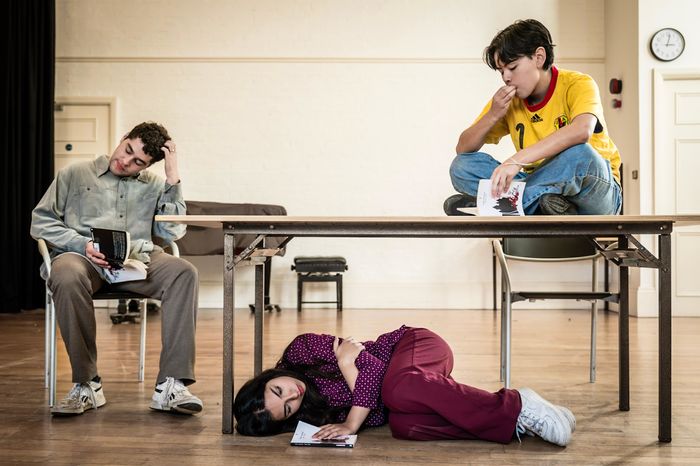Gaslight, girlboss, go and see
Amy Brook reports from this adept depiction of the consequences of sexual assault and toxicity

It’s a question we hear time and time again: what if we treated psychological trauma like we did a physical injury? Shaira Berg imaginatively transforms this question into the basis of Gaslight, an intense sixty minutes following Scarlet (Berg) who wakes up to find a gaping chest wound. Her assault is made all the more visually, and viscerally, arresting.
“Berg recognises that such an important theme needs representation that is nuanced, and also takes new artistic risks in its portrayal”
As highlighted in the show’s programme, most women experience sexual assault, directly or indirectly. The scene in which a friend reveals her own healed wound to Scarlet captures this unspoken solidarity between victims of assault. Scarlett is blamed for even talking about her trauma: her shirt, caked in blood by the end, makes others instantly uncomfortable. In Gaslight, Berg recognises that such an important theme needs representation that is nuanced, and also takes new artistic risks in its portrayal. Berg’s creativity is similarly apparent in a dreamlike sequence in which Scarlet relives a traumatic moment, surrounded by her former friends, repeating her worst fears. The feeling of paralysis in your dark thoughts, all terrifyingly real to Scarlet, is immediately understandable.
“The compact space of New Cellars adds to the play’s claustrophobia”
Not to be overlooked is the performance of Berg herself. Her diction, quick and excitable as the over-eager fresher, becomes almost strangled in the wake of the assault. Walton-Smiths’ Angie was similarly strong in the dream sequence; she transforms from a friend that is unreliable, but ultimately still true to life, into a devil sitting on Scarlet’s shoulder. Tate (Ryan Key) is convincing in his banal narcissism. Elsewhere, Simon (Misha Koshutskyy) serves well as comic relief towards the start of the play, and Scarlet’s sister (Ibrahim) was a highlight. Ibrahim strikes the balance between her character in private, comforting and encouraging her sister, and a studied nonchalance in public. With brief interventions as Scarlet and Tate’s university tutor, Mark Hampton effortlessly portrayed the well-intentioned middle-class academic. This charming figure, recognisable to anyone at Cambridge, is flustered the moment Scarlet reveals her assault, offering Scarlet a list of “links” and “professional help” with maximum discomfort. The compact space of New Cellars adds to the play’s claustrophobia. With the focus squarely on the strained relationships between Scarlet and those around her, the stripped-back staging and costuming allows the audience to focus on emotions alone.
For all the play’s strengths, there were some moments that did not quite gel. Although there was an improvement after the initial scene, some lines were delivered too quickly and quietly. While this replicates the atmosphere of a house party - hearing conversations everywhere, but not really listening - this effect did not feel entirely intentional. Some pieces of dialogue also seemed a little contrived; although it is clear that Angie and Scarlet’s relationship is not intended to be the most amicable, there were moments where one would immediately launch an insult at the other, where there was potential for a more gradual tension to be built up. Drug use in the play seemed somewhat cliché too. Secondary school lectures about peer pressure come to mind when Katie snorts a line in order to prove herself. Although it is clear that the psychological impact of Scarlet’s assault, and not her being under the influence of absinthe, was the main focus of Gaslight, I wondered whether more nuance here might have been interesting.
For such a short play, Gaslight offers plenty food for thought. Despite some moments that were harder to follow, and an ending that was a little predictable, Berg and the cast perform psychologically difficult scenes with conviction.
 News / Proposed changes to Cambridge exam resits remain stricter than most7 May 2024
News / Proposed changes to Cambridge exam resits remain stricter than most7 May 2024 News / Cambridge students set up encampment calling for Israel divestment6 May 2024
News / Cambridge students set up encampment calling for Israel divestment6 May 2024 Features / Cambridge punters: historians, entertainers or artistes? 7 May 2024
Features / Cambridge punters: historians, entertainers or artistes? 7 May 2024 Sport / The ‘netball girl’: myth or reality?7 May 2024
Sport / The ‘netball girl’: myth or reality?7 May 2024 Theatre / A nuanced and neurodivergent Carrie comes to the ADC6 May 2024
Theatre / A nuanced and neurodivergent Carrie comes to the ADC6 May 2024






